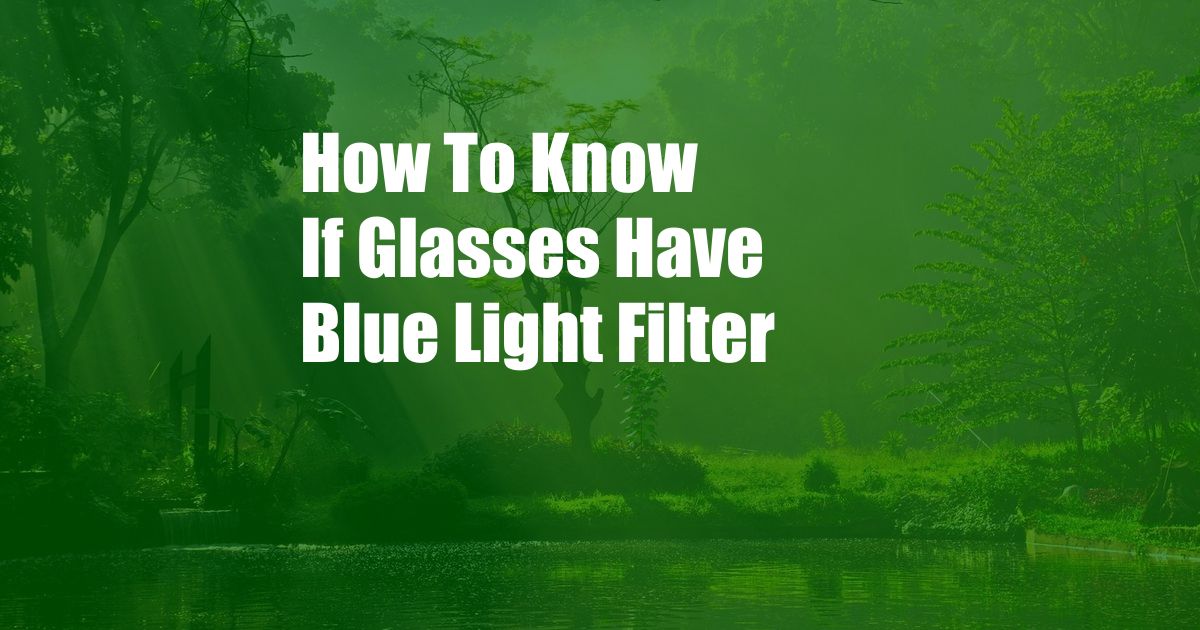
<h2>How to Know if Glasses Have a Blue Light Filter</h2>
<p>As someone who spends countless hours staring at screens, I've become increasingly aware of the potential harm blue light can cause to my eyes. To combat this, I decided to invest in a pair of glasses with a blue light filter. But before making the purchase, I wondered how I could be sure the glasses would have the desired effect.</p>
<p>After some research, I discovered a few foolproof ways to determine whether glasses have a blue light filter. Here's a comprehensive guide to help you make an informed decision.</p>
<h2>Blue Light Filter: Definition and Benefits</h2>
<p>Blue light is a type of high-energy visible light emitted from electronic devices like smartphones, tablets, and laptops. While it's a natural part of the light spectrum, excessive exposure to blue light can lead to eye strain, headaches, and even disrupted sleep patterns.</p>
<p>A blue light filter is a special coating applied to lenses that blocks or absorbs a portion of this harmful blue light, protecting the eyes from its detrimental effects. Studies have shown that blue light filters can significantly reduce eye strain, improve sleep quality, and even protect the retina from age-related damage.</p>
<h2>Identifying Blue Light Blocking Glasses</h2>
<h3>1. Check the Lens Label or Packaging</h3>
<p>Reputable manufacturers will clearly indicate the presence of a blue light filter on the glasses' lens label or packaging. Look for terms like "blue light blocking," "blue-cut lens," or "low blue light protection." These phrases signify that the glasses have been treated with a special coating designed to reduce blue light transmission.</p>
<h3>2. Perform the "White Paper Test"</h3>
<p>Take a white piece of paper and hold it about 12 inches away from the glasses. Look through the lenses at the paper. If the paper appears tinted slightly yellow or orange, the glasses likely have a blue light filter. This is because the filter absorbs some of the blue light, resulting in a warmer color tone.</p>
<h3>3. Use a Blue Light Meter</h3>
<p>For a more precise measurement, you can use a blue light meter. These handheld devices measure the amount of blue light emitted from various sources, including glasses. Position the meter close to the glasses' lenses and it will provide a numerical value indicating the percentage of blue light blocked.</p>
<h3>4. Observe the Edge of the Lenses</h3>
<p>Some blue light blocking glasses have a slight purple or blue tint around the edges of the lenses. This is a telltale sign that the glasses have been treated with a blue light filter. However, this method is not foolproof, as some manufacturers may apply a colored coating to mimic the appearance of a blue light filter.</p>
<h3>5. Consult an Optometrist</h3>
<p>If you're still unsure whether your glasses have a blue light filter, the most definitive way to confirm is to consult an optometrist or eye care professional. They can examine your glasses and provide a professional opinion on the presence of a blue light filter.</p>
<h2>Tips and Expert Advice for Choosing Glasses with a Blue Light Filter</h2>
<h3>1. Consider Your Usage Patterns</h3>
<p>The amount of blue light exposure you experience depends on your screen time habits. If you spend extended periods working on computers or using electronic devices, investing in a stronger blue light filter may be necessary. For occasional screen use, a weaker filter may suffice.</p>
<h3>2. Choose Reputable Brands</h3>
<p>Not all blue light filters are created equal. Stick with reputable brands that have a proven track record of producing high-quality lenses with effective blue light blocking capabilities.</p>
<h2>FAQ on Blue Light Filter Glasses</h2>
<strong>Q: Do all glasses have a blue light filter?</strong>
<p>No, not all glasses have a blue light filter. Only glasses with a special coating or treatment designed to block or absorb blue light have this feature.</p>
<strong>Q: How effective are blue light filters?</strong>
<p>The effectiveness of blue light filters varies depending on the quality and strength of the filter. Some filters can block up to 90% of blue light, while others may only block a smaller percentage.</p>
<strong>Q: Are blue light filters safe?</strong>
<p>Yes, blue light filters are generally safe for use as long as they are used as directed and the lenses are of good quality. However, some people may experience eye discomfort or headaches with prolonged use, especially in the case of excessively strong filters.</p>
<h2>Conclusion</h2>
Knowing whether your glasses have a blue light filter is crucial for protecting your eyes from harmful blue light exposure. By following the methods outlined above, you can ensure you choose glasses that effectively block or absorb this damaging light. Whether you're a tech-savvy individual or simply want to safeguard your vision, blue light blocking glasses are a valuable investment for your eye health.
<p>I encourage you to explore the topic further and seek professional advice from an optometrist to determine the best solution for your individual needs. Do you have any questions or experiences regarding blue light filter glasses? Let us know in the comments below.</p>
